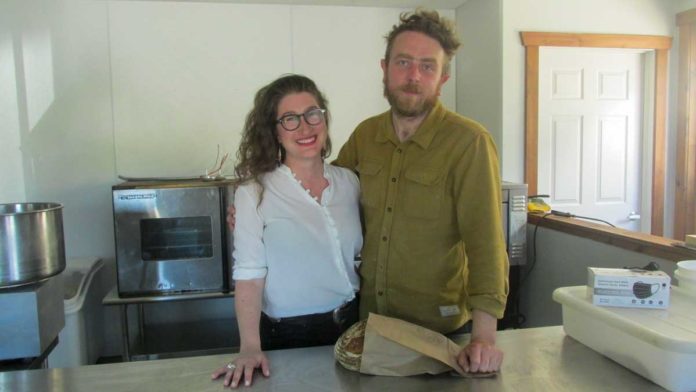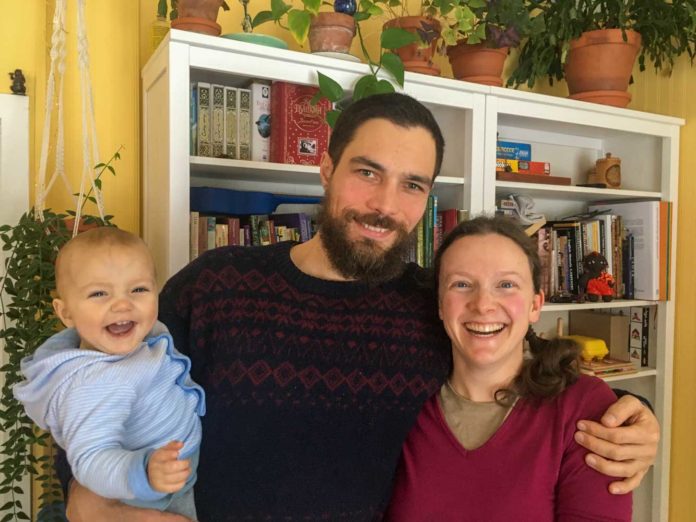GORE BAY—A love of fashion and concerns about its environmental impact has inspired the development of a new local thrift shop. With clothing stores deemed non-essential during the pandemic, the business is strictly online at this time. Bec Company was recently launched by Manitoulin Island’s Rebecca Deeg and she’s thrilled with the initial positive response from fellow Islanders.
Ms. Deeg was a “typical girly girl” growing up and being in the fashion world was her dream. She remembers being nine years old and doodling outfits in school notebooks. After her grandmother taught her to sew, she began making her own clothes. As a teenager, Ms. Deeg and her best friend frequented the consignment store then open in Gore Bay. “We’d find so many treasures and everything was at a very reasonable price, so it was like hitting the jackpot,” she said. “We were devastated when it closed a couple of years ago.”
That led to thoughts of opening her own store and following graduation from Algonquin College with a business diploma, she drafted a business plan. “Starting a business can be scary,” Ms. Deeg said. “Change can be scary.” Shortly after that the global pandemic hit.
According to Statistics Canada, there were 19,021 clothing stores in Canada in 2019, mostly selling new clothing. Even though e-commerce increased by 70.5 percent during the pandemic, sales fell 23.6 percent in 2020 for Canadian retail apparel sales.
“Our entire world flipped upside down,” she continued. “So many people have lost their jobs. Prices have skyrocketed and people are struggling. Somehow, amongst all of that, we are spending more money than ever spent in the history of humanity. But why, if you don’t have to? Why not opt for something in excellent condition that is far more affordable?”
Ms. Deeg went ahead with her plan. A lot of businesses have been deemed non-essential in the midst of all this chaos, she said. That’s where the idea of an online platform germinated. “With the current shipping transit times because of increased online shipping, why not have a local retailer that you can purchase from online then pick up your order or have it delivered in less than a few business days? It all just made sense that the time was now.”
The multi-talented Ms. Deeg maintains the e-commerce site herself, using photos she has taken and edited after new items are sorted, cleaned and tagged. She designed the logo and creates her own marketing materials.
Bec Co is not just about the fashion. As she researched the fashion industry for her business plan she realized just how detrimental the sector is. Ms. Deeg is someone who loves and advocates for the environment and she brings those values forward in her business model. “The fashion industry makes up 10 percent of all of humanity’s carbon emissions,” she shared. “This is a form of pollution caused after human activity causes carbon dioxide to enter the air, significantly affecting our atmosphere and climate. It is second to the oil industry for pollution. The fashion industry is also the second largest consumer of the world’s water supply. These are mainly the effects from production only. The ending doesn’t get any better.”
“Roughly 85 percent of all textiles end up in landfills, the equivalent of nearly one garbage truck of clothing dumped every second,” she continued. “Not to mention the microplastics that pollute the oceans through the process of production and during care and upkeep. This was extremely heartbreaking for me.”
In a 2015 study conducted in Ontario, nine percent of participants declared they throw all of their unwanted clothes into the garbage and never considered doing something else with them. In context, that’s roughly 1.3 million Ontarians whose unwanted clothing end up in landfills. Few Canadian municipalities have a textile diversion program and don’t know how much textile waste is in their waste stream. In Ontario, municipalities are not currently required to divert textiles or track the volume of their textile waste. The most conservative percentage of textiles that end up in Ontario’s waste stream is 4.43 percent, or 176,343 tonnes. That extrapolates to a total amount of 480,576 tonnes across Canada for clothing, home textiles, footwear, textiles, accessories, soft toys and other residential textiles.
Most people aren’t even aware the connection between textiles and plastics. When most people think of plastics, they think of packaging, containers, straws and cutlery but seven percent of all plastics in Canadian landfills are textiles. Waste plastics from textiles accounted for 235,000 tonnes of waste across Canada in 2017.
As someone who loves the fashion industry, Ms. Deeg can’t help but be concerned. “We’re reaching record high heats, record lows for the arctic ice surface and losing a vast amount of our forests,” she said. “I don’t understand how the effects of climate change could not be a concern. Do humans not see the planet suffering? It’s the air we breathe, the soil that grows our food and the water we drink. We need this place and we need to do better, if not for us then for our children and grandchildren who will inherit this planet from us.”
The environmental impacts of this industry actually became Ms. Deeg’s largest motivator to get the business up and running. She took it upon herself to not only spread awareness but also to do something about it. She wanted to be a changemaker. “That’s why all of our products are preloved,” she said. “They are not newly fabricated. If we do have new products, more will be sourced from an overstock.”
Ms. Deeg will accept clothing donations (message through Facebook page or email through website). Although she prefers donations to be in excellent condition, those that are not saleable will be donated unless they are cotton. She has another project up her sleeve, this one involving reusing cotton textiles. There will be an announcement on that soon, she said.
Bec Co will also “recycle” all leftover product through rehoming or other means, she added. “I am very attentive and observant when sorting the clothing to ensure it’s in superb condition, because I myself wouldn’t want to purchase anything less. This does mean some items don’t make the cut. Items that are still in good condition will be donated to our most vulnerable citizens.” Ms. Deeg has contacted a few local organizations but storage does seem to be an issue. This is completely understandable, she notes, and proves her point regarding “the absurd amount of clothing production and the wasted amounts dumped in landfill.”
You can shop for women’s and men’s clothing, accessories and footwear at the online shop. Ms. Deeg did not originally plan to source products through contribution but after she announced the opening, “there were so many people who messaged me asking if I would take their items,” she said. “People were grateful that they didn’t have to drive off-Island to rehome their perfectly good items. They were happy to support a local small business at the same time. The interest was understandable considering the difficulty in finding somewhere that is accepting clothing drop offs right now, largely due to shelters not being currently open but storage also seems to be a factor for many places. Unfortunately, there is an abundance of clothing floating around and the majority of it will go into landfills.”
Many people have already reached out to praise or thank her for offering an affordable, convenient, reliable and environmentally friendly option for the community, she said. “But I want to thank them. The support and encouragement I’ve been receiving is extremely motivating and inspiring. I wouldn’t have been able to do this without all of you.”
Shop online at Bec Company (becco.ca) or email for more information info@becco.ca.





